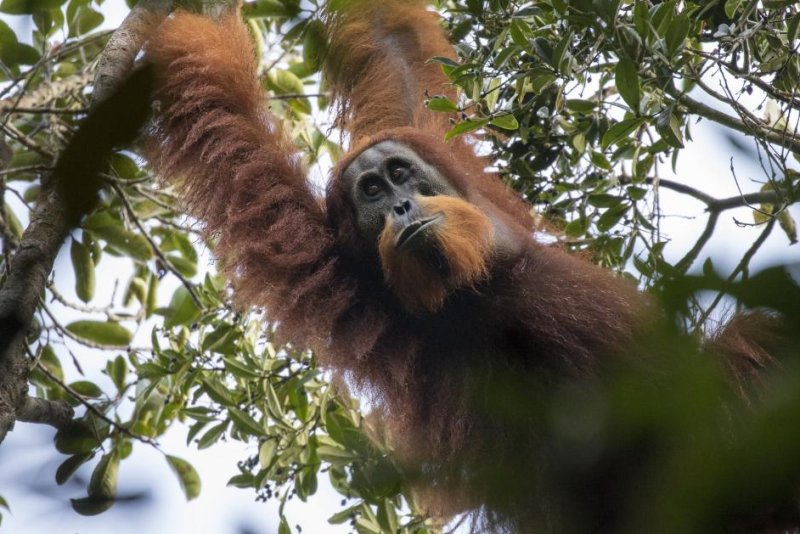Scientists announce discovery of third orangutan species
"The Batang Toru orangutans appear to be direct descendants of the initial orangutans that had migrated from mainland Asia," researcher Alexander Nater said.
2 November 2017 (UPI) -- Scientists have determined that an isolated population of orangutans living among the lowlands of Sumatra are unique enough to warrant a new species designation.
Researchers named the Tapanuli orangutan Pongo tapanuliensis and described the new species in a paper published this week in the journal Current Biology.
With the new designation, there are now seven living great ape species -- the Tapanuli orangutans join the Sumatran and Bornean orangutans, eastern and western gorillas, chimpanzees and bonobos.
 "It isn't an everyday event that we find a new species of great ape, so indeed the discovery is very exciting," Michael Krutzen, an anthropologist at the University of Zurich in Switzerland, said in a news release.
"It isn't an everyday event that we find a new species of great ape, so indeed the discovery is very exciting," Michael Krutzen, an anthropologist at the University of Zurich in Switzerland, said in a news release.
Scientists weren't sure the unique orangutan population existed until 1997. The apes occupy a portion of North Sumatra, an Indonesian Island, known as Batang Toru. The region that lies south of what was believed to be the southern boundary of the Sumatran orangutan's range.
Slowly, the population became better known to scientists, but it wasn't until 2013 that researchers realized the Batang Toru orangutan might be unique. Scientists were able to study the remains of an ape killed by humans. They noted key structural differences in the ape's skull and teeth.
New genomic analysis suggests the population is indeed unique. In fact, Batang Toru, or Tapanuli, orangutans split three million years ago from the Borneo population. The Sumatran and Borneo orangutans diverged just 700,000 years ago.
"The Batang Toru orangutans appear to be direct descendants of the initial orangutans that had migrated from mainland Asia, and thus constitute the oldest evolutionary line within the genus Pongo," said Alexander Nater, researcher at the Unversity of Zurich. "The Batang Toru population was connected to populations to the north until 10,000 or 20,000 years ago, after which it became isolated."
Though exciting, the new designation means there are 800 fewer Sumatran orangutans than previously thought. There is also a new species that needs protection. The Batang Toru orangutan is under threat from poaching and habitat loss.
The finding is also a humbling reminder of all the wealth of scientific knowledge that is yet to be uncovered -- and a reminder to tread lightly.
"Great apes are among the best-studied species in the world," said Erik Meijaard, a researcher at the Australian National University. "If after 200 years of serious biological research we can still find new species in this group, what does it tell us about all the other stuff that we are overlooking: hidden species, unknown ecological relationships, critical thresholds we shouldn't cross? Humans are conducting a vast global experiment, but we have near-zero understanding of what impacts this really has, and how it could ultimately undermine our own survival."
original article written for UPI by Brooks Hays - for more information visit: http://www.batangtoru.org/orangutan/

